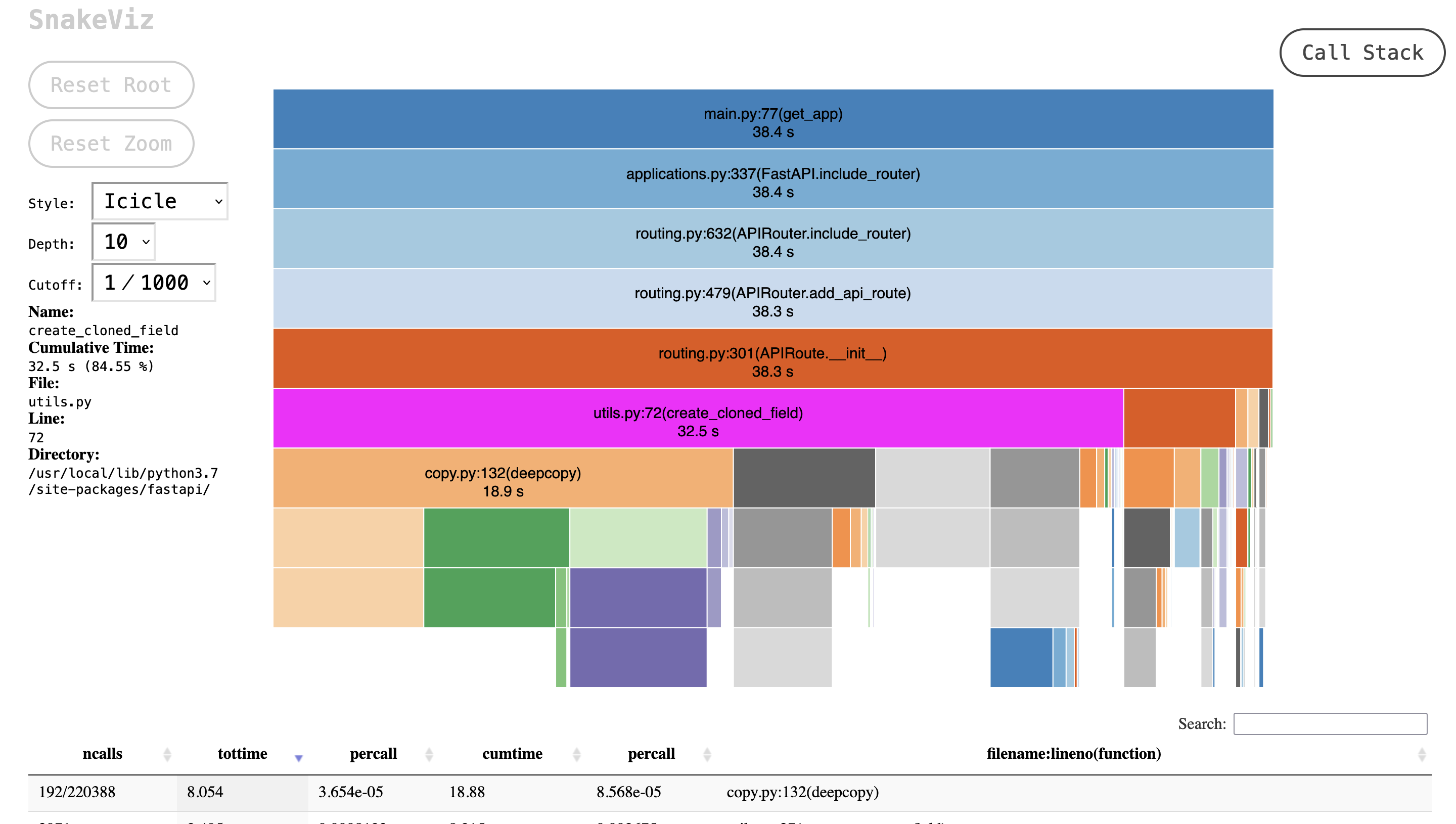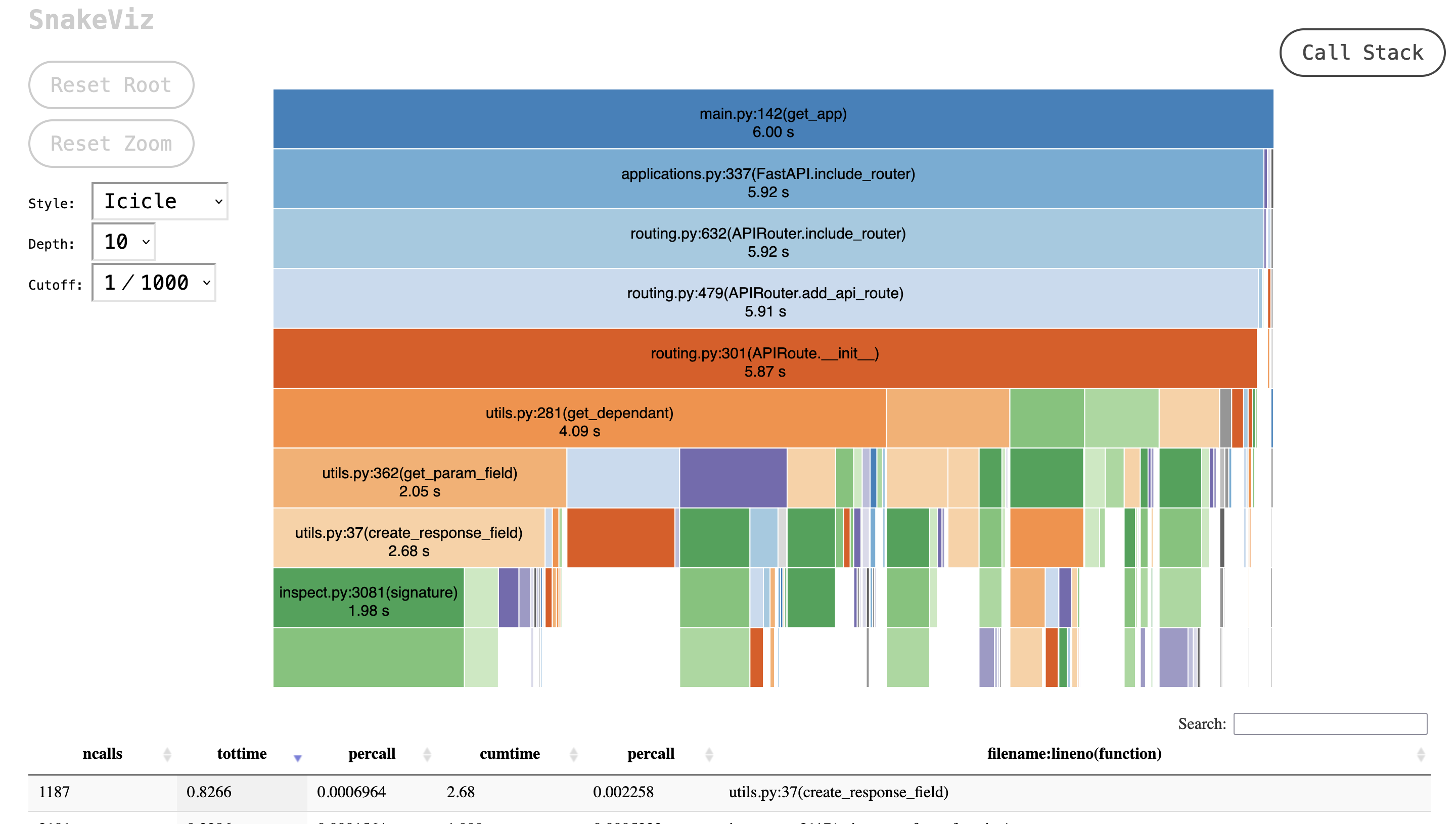-
-
Notifications
You must be signed in to change notification settings - Fork 6k
This issue was moved to a discussion.
You can continue the conversation there. Go to discussion →
New issue
Have a question about this project? Sign up for a free GitHub account to open an issue and contact its maintainers and the community.
By clicking “Sign up for GitHub”, you agree to our terms of service and privacy statement. We’ll occasionally send you account related emails.
Already on GitHub? Sign in to your account
created_cloned_field — slow performance with many models
#4644
Comments
|
We are currently having this issue in a bigger FastAPI project. The startup time did increase to a minute till several minutes over the last months - just to get the server running and on every code change while doing development. As a quick test we did just "remove" the So I would love to get this fixed. ;-) |
|
Little update: I did use the patch provided in the pull request after all, but just reverted this on my local dev setup as it did produce problems when working with ForwardRef's. Those seem to be not resolved any more, possibly because an "old version" of the model is cached now. Have to dig into this - but the patch will introduce regression bugs for sure....so just you know. |
|
Update again - this is a real issue: Thing is besides taking for basically ever to load without the patch and loading in about 30 seconds with the patch....also the RAM usage skyrockets....which the patch also fixes.
Again just FYI - we will need a good solution for that. |
|
Thanks for giving this a test @ddanier ! Can you share an minimal complete example that uses forward refs and demonstrates how it breaks your routes? I can investigate adding handling for that case. |
|
@madkinsz I will do that....sadly I did not have the time yet to really look into this. All details above are bits my colleagues gave me when trying to work on our own performance issue. The project we try to use this is pretty huge and even the ForwardRefs are no just plain normal ForwardRefs (they are part of dynamically generated pydantic model)...so I will need to setup a new project to get a simple example for this. What I can say for sure is that the problem occurred after we did try the patch and thus must be a direct result of this. Sorry if this takes some time, much to do currently. :) |
|
Any update on this? |
|
We are also heavily hit by this issue. But we added a hacky workaround for our tests which speeds up the test initialization hugely! It would be great to get the issue fixed. The hack is here for anyone hit by the same issue: FASTAPI_CLONED_TYPES_MEMO = {}
# Workaround for FastAPI initialization slowness causing slow test startup.
# https://github.com/tiangolo/fastapi/issues/4644
@pytest.fixture(scope="session")
def fix_slow_fastapi_issue(monkeypatch: MonkeyPatch) -> None:
import fastapi.routing
import fastapi.utils
orig = fastapi.utils.create_cloned_field
def patch(
field: ModelField, *, cloned_types: Optional[Dict[Type[BaseModel], Type[BaseModel]]] = None
) -> ModelField:
return orig(field, cloned_types=FASTAPI_CLONED_TYPES_MEMO if cloned_types is None else cloned_types)
patcher.setattr(fastapi.utils, "create_cloned_field", patch)
patcher.setattr(fastapi.routing, "create_cloned_field", patch)
@pytest.fixture(scope="session")
def http_app(fix_slow_fastapi_issue: None) -> FastAPI:
return create_test_app() # Does the FastAPI initializationProfiles via pytest-profiling After: cc @ddanier what issue are you seeing with the proposed fix do you have an example to give? We are also running a big FastAPI service but the patch seems to work for us. |
|
We are currently using a monkey patched version of the normal # flake8: noqa
"""
This is a faster version of the main.py.
This version is faster by monkey patching the internals of FastAPI. It is
intended to NEVER be used in production. It is only for testing and
local development.
To can activate this file you may just create a `docker-compose.override.yml`
with the following contents:
---
version: "3.6"
services:
api:
command:
[
"poetry",
"run",
"uvicorn",
"something.fast_main:app",
"--host=0.0.0.0",
"--reload",
]
---
"""
from dataclasses import is_dataclass
from typing import Optional, cast
from weakref import WeakKeyDictionary
from pydantic import BaseModel, create_model
from pydantic.fields import ModelField
from pydantic.utils import lenient_issubclass
def patched_create_cloned_field(
field: ModelField,
*,
cloned_types: Optional[dict[type[BaseModel], type[BaseModel]]] = WeakKeyDictionary(),
) -> ModelField:
# _cloned_types has already cloned types, to support recursive models
if cloned_types is None:
cloned_types = WeakKeyDictionary()
original_type = field.type_
if is_dataclass(original_type) and hasattr(original_type, "__pydantic_model__"):
original_type = original_type.__pydantic_model__
use_type = original_type
if lenient_issubclass(original_type, BaseModel):
original_type = cast(type[BaseModel], original_type)
use_type = cloned_types.get(original_type)
if use_type is None:
use_type = create_model(original_type.__name__, __base__=original_type)
cloned_types[original_type] = use_type
for f in original_type.__fields__.values():
use_type.__fields__[f.name] = patched_create_cloned_field(
f, cloned_types=cloned_types,
)
new_field = fastapi.utils.create_response_field(name=field.name, type_=use_type)
new_field.has_alias = field.has_alias
new_field.alias = field.alias
new_field.class_validators = field.class_validators
new_field.default = field.default
new_field.required = field.required
new_field.model_config = field.model_config
new_field.field_info = field.field_info
new_field.allow_none = field.allow_none
new_field.validate_always = field.validate_always
if field.sub_fields:
new_field.sub_fields = [
patched_create_cloned_field(sub_field, cloned_types=cloned_types)
for sub_field in field.sub_fields
]
if field.key_field:
new_field.key_field = patched_create_cloned_field(
field.key_field, cloned_types=cloned_types,
)
new_field.validators = field.validators
new_field.pre_validators = field.pre_validators
new_field.post_validators = field.post_validators
new_field.parse_json = field.parse_json
new_field.shape = field.shape
new_field.populate_validators()
return new_field
import fastapi # noqa
fastapi.routing.create_cloned_field = patched_create_cloned_field
from something.main import app # noqaNote that the docs at the top only fit our own setup with running everything in docker and note that I did remove the app name (replaced by "something"). Anyways this seems to work for us now and we do not have any issues. I cannot reproduce the problems we had any more. RAM usage is still also down by a huge amount. Nice thing about this additional file + the monkey patch is that we still can just build a normal production version that does include this. |
|
Thank you for the patch, @ddanier. I can attest that this is an issue with one of the larger services we have. |
|
Just leaving a note that I'll try the patch as well. When I start the app in itself, it's not so much of a problem per se but in my tests, this slowness is repeated for each test case and has rendered the tests very slow. |
|
Glad I found this issue thread, my project was getting too slow to debug. maybe it will get some love at some point @tiangolo ? |
|
Same here, especially annoying with |
|
Although turning off(or caching here) response models will speed up startup a lot, it is still a problem with cold starts of Lambda. |
This issue was moved to a discussion.
You can continue the conversation there. Go to discussion →


First Check
Commit to Help
Example Code
Description
When building a FastAPI application with nested Pydantic models, the
create_cloned_fieldutility in theAPIRouteinitialization is quite slow.For the trivial example, you can see that
create_cloned_fielddominates the runtime with 90% of CPU time. The majority of this is spent deep copying.Note, timing is CPU time not WALL time
If we replace this trivial application with the one from Prefect,
from prefect.orion.api.server import create_app, we can see that this is significant in a real world example.With a patch to retain the cache across calls to this function, we can get this down to 50% of the CPU time with a ~5x overall speedup.
This speedup persists and is even more significant in a real-world application with
create_cloned_fieldaccounting for only 11% of the CPU time.Operating System
macOS
Operating System Details
No response
FastAPI Version
0.74.0
Python Version
3.8.12
Additional Context
This may also be resolvable with pydantic/pydantic#1008 as mentioned in #894 (comment)
The text was updated successfully, but these errors were encountered: